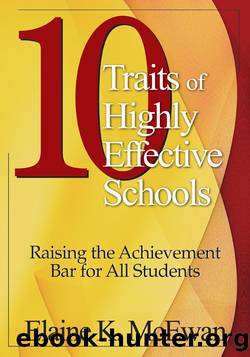Ten Traits of Highly Effective Schools by McEwan-Adkins Elaine K.;

Author:McEwan-Adkins, Elaine K.; [McEwan, Elaine K.]
Language: eng
Format: epub
ISBN: 1651811
Publisher: Corwin Press
Published: 2008-07-16T00:00:00+00:00
HIGH EXPECTATIONS AND EFFICACY
To have faith in oneâs ability to raise achievement in a school where students have previously never been engaged and motivated requires a strong sense of personal efficacy. Ensuring academic success for very-low-performing students also requires collective efficacy, a belief in the abilities of oneâs colleagues to come alongside and do their share. However, some educators simply do not believe that raising the achievement of low-performing students is possible. They have closed their minds to the confirming data and impressive results from other schools. These individuals fall into a category of educators that Jeff Howard (2003) of the Efficacy Institute describes this way: âThere is a widespread culture of disbelief in the learning capacities of many of our children, especially children of color and the economically disadvantaged. Most educators, along with other Americans, have been socialized to believe that intelligence is innate, fixed at birth, and unequally distributed: âSome have it and some donâtââ (p. 83). In addition to the disbelievers, there are many educators who are worried that they may not be capable of motivating and engaging disengaged students. Both the disbelievers and those who feel powerless to make a difference need embedded professional development, high expectations, encouragement, and multiple opportunities for scaffolded learning from a strong instructional leader and their colleagues.
Psychologist Albert Bandura defined self-efficacy as the âbelief in oneâs capacity to organize and execute the courses of action required to produce given attainmentsâ (Bandura, 1997, p. 3). There have been many studies showing a strong relationship between teachersâ perceived self-efficacy and their studentsâ achievement (Ashton & Webb, 1986; Tschannen-Moran, Hoy, & Hoy, 1998). Perceived collective efficacy refers to âthe judgment of teachers in a school that the faculty as a whole can organize and execute the courses of action required to have a positive effect on studentsâ (Goddard, Hoy, & Hoy, 2004, p. 4).
The experience that is most predictive of future success is a previous mastery experience. For example, a group of teachers or a team of athletes that has achieved success at least once automatically increases their likelihood of doing it again.
Some teachers pose this question when they overhear gossip in the teachersâ lounge about a former student who has failed another course or been suspended one more time. âWhat did you expect?â they say, throwing up their hands. âI could have told you so.â
Hereâs my answer to the question, âWhat did you expect?â
âWell, actually I expected a whole lot more. I expected the student would be able to make the grade and stay in school. I expected that working as a team, this staff could make a difference in this studentâs life.â
Success for students, whether low achieving or honor roll, is about expectations. Students who donât arrive at school with a built-in set of expectations need highly effective teachers to give them theirs.
Download
This site does not store any files on its server. We only index and link to content provided by other sites. Please contact the content providers to delete copyright contents if any and email us, we'll remove relevant links or contents immediately.
Chicken Soup for the Soul Presents Teens Talkin' Faith by Jack Canfield(662)
Understanding PDA Autism in Kids: A Guide for Parents and Teachers to Support Neurodiverse Learners by Jehu Len(555)
The Victorian Era: A Captivating Guide to the Life of Queen Victoria and an Era in the History of the United Kingdom Known for Its Hierarchy-Based Social Order by Captivating History(425)
Brain Teasers to Build Critical Thinking Skills by Safarova Kris(411)
Brain Teasers to Build Critical Thinking Skills: Brain Exercises for Tech, Banking, Case Interview Prep, and to Keep Your Mind Sharp by Kris Safarova(411)
100 Ideas for Secondary Teachers: Engaging Parents by Janet Goodall & Kathryn Weston(388)
Python 101 - Fundamentals by Sam(373)
Critical Curriculum Leadership : A Framework for Progressive Education by Rose M. Ylimaki(363)
Writing Solid Code: Development Philosophies for Writing Bug-Free Programs by Steve Maguire(357)
The Art of Emotional Validation: Improve Your Communication Skills and Transform Your Relationships by Validating Emotions and Feelings by Emily Wright(339)
Intersectionality in Educational Research by Dannielle Joy Davis; James L. Olive; Rachelle J. Brunn-Bevel; Susan R. Jones(331)
The Knights Templar: An Enthralling History of the Rise and Fall of the Most Influential Catholic Military Order by Wellman Billy(330)
A Beginner's Guide to SSD Firmware by Unknown(327)
The Future Knowledge Compendium by Ellyard Peter;(319)
How to be assertive in any situation by Hadfield Sue & Hasson Gill(310)
Making Connections in and Through Arts-Based Educational Research by Hala Mreiwed Mindy R. Carter Sara Hashem Candace H. Blake-Amarante(306)
Foundations of Educational Research by Victoria Elliott(305)
What Every Teacher Should Know about Learning, Memory, and the Brain by Tileston Donna E. Walker;(305)
Message from the Pleiades; The Contact Notes of Eduard Billy Meier v1 only by unknow(301)
